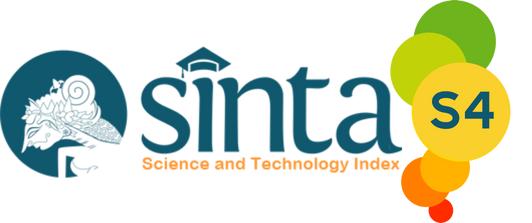The Relationship Between Quran Memorization Ability and Mathematics Learning Outcomes of 11th Grade Student at MA Putri Al-AAiziyah in the 2023/2024 Academic Year
DOI:
https://doi.org/10.29303/goescienceed.v5i4.477Keywords:
Qur'an, Memorization Ability, Mathematics Learning OutcomesAbstract
This study examines the relationship between the ability to memorize the Qur'an and the mathematics learning outcomes of 11th-grade students at MA Putri Al-Aziziyah in the 2023/2024 academic year. Memorizing the Qur'an requires a high level of concentration, which also plays a role in enhancing brain performance. When brain cells are utilized positively and actively, brain performance improves, making students who are accustomed to memorizing the Qur'an tend to have better cognitive function. This research is a correlational study with a quantitative approach, involving 63 samples from a total of 170 students. Data was collected through oral tests and interviews and analyzed using the Pearson product-moment correlation. The results indicate that both mathematics learning outcomes and the ability to memorize the Qur'an are very good. The data shows that 57.14% of students have memorized 1-10 juz, 14.28% have memorized 11-20 juz, and 28.58% have memorized 21-30 juz. Based on the data analysis, a significance value of 0.042 < 0.05 was obtained, indicating a positive relationship between the ability to memorize the Qur'an and mathematics learning outcomes, with a correlation value of 0.257, signifying a weak relationship between the two variables.
References
Abdullah, M. (2015). Metode Penelitian Kuantitatif. Yogyakarta : Aswaja Pressindo.
Assegaf, S. (2020). Meraih Prestasi Belajar dengan Tahfidz Al-Qur’an Tinjauan Sekolah Islam di Jakarta. Jakarta: Penerbit A-Empat. https://books.google.co.i d/books?id=YM5VEAAAQBAJ
Fatmi, F., Fatrima Santri Syafri, & Poni Saltifa. (2022). Pengaruh Kemampuan Menghafal Al-Quran terhadap Pemahaman Konsep Matematika bagi Siswa Madrasah Aliyah Pondok Pesantren Pancasila Kota Bengkulu. Jurnal Pendidikan Mipa, 12(3), 464–471. https://doi.org/10.37630/jpm.v12i3.639
Firdaus, Z., & Wiyono, A. H. (2019). Pengaruh Menghafal Al-Qur’an Terhadap Pembentukan Akhlak Siswa. Jurnal Samawat, 03(01), 83–84. https://jurnal.badrussholeh.ac.id/index.php/samawat/article/view/263
Leni, M., & Sholehun. (2021). Analisis Faktor-Faktor yang Mempengaruhi Hasil Belajar Bahasa Indonesia pada Siswa Kelas IV SD Muhammadiyah Majaran Kabupaten Sorong. Jurnal Keilmuan, Bahasa, Sastra, Dan Pengajarannya, 2(1), 66–74. https://unimuda.e-journal.id/jurnalbahasaindonesia/article/download/952/582
Maimun, L. (2017). Islamic Studies & Character Building. Pekalongan: Penerbit NEM. https://books.google.co.id/books?id=LQwaEAAAQBAJ
Marwansyah & Hidayat, A. W. (2019). Kegiatan Ekstrakurikuler Tahfidz Qur’an Juz 30 Dengan Aktivitas Belajar Siswa. Madaniyah, 9(2), 242–243.
Mukhid, A. (2021). Metodologi Penelitian Pendekatan Kuantitatif. Surabaya: Jakad Media Publishing. https://books.google.co.id/books?id=lQ4lEAAAQBAJ
Muslih, A. (2023). Meningkatkan Motivasi Belajar dan Prestasi Belajar Akademik Dengan Akselerasi Tahfidzul Qur’an (Makassar). Rizmedia Pustaka Indonesia. https://books.google.co.id/books?id=rbDNEAAAQBAJ
Nafliani, A., Ansari, M. I., Barsihanor, B., & Kumala, S. (2021). Hubungan Hafalan Al- Qur’an dengan Hasil Belajar Peserta Didik pada Mata Pelajaran Matematika di SDTQ-T An Najah Cindai Alus Martapura. JIEES: Journal of Islamic Education at Elementary School, 2(2), 53–62.
Pantiwati, Y., Restian, A., Sumarsono, P., & Husamah. (2016). Belajar dan Pembelajaran. Malang: UMM Press. https://books.google.co.id/books?id=F5xjDwAAQBAJ
Rahmi Ramadhani, S. P. I. M. P., & Nuraini Sri Bina, S. P. M. P. (2021). Statistika Penelitian Pendidikan: Analisis Perhitungan Matematis dan Aplikasi SPSS. Prenada Media. https://books.google.co.id/books?id=0WFHEAAAQBAJ
Setiawan, M. A. (2017). Belajar dan Pembelajaran. In Ponorogo (Ed.), Uwais Inspirasi Indonesia. Uwais Inspirasi Indonesia. https://www.google.co.id/books/edition/Belajar_dan_Pembelajaran/CPhqDwAAQBAJ?hl=id&gbpv=0
Sugiyono, D. (2010). Metode penelitian kuantitatif kualitatif dan R&D. Bandung: Alfabeta.
Sutisna, E. (2023). Evaluasi program tahfiz Al-Qur’an. Jakarta: Publica Indonesia Utama. https://books.google.co.id/books?id=6WTTEAAAQBAJ
Thohir, M. (2021). Pengaruh Menghafal Al-Qur’an Terhadap Prestasi belajar PAI Siswa di SMP IT Permata Hati Tebing Tinggi. http://repository.uinsu.ac.id/id/eprint/13471
Wulandari, T. (2023). Faktor – Faktor yang Mempengaruhi Prestasi Belajar Siswa SMK. Arus Jurnal Psikologi Dan Pendidikan, 2(3), 267–284. http://jurnal.ardenjaya.com/index.php/ajpp
Yudha, E. C., & Rohmadi, Y. (2022). Hubungan Kemampuan Hafalan Al-Qur’an dengan Prestasi Pelajaran Matematika di Kelas VIII SMP-IT Ibnu Abbas Klaten Tahun Pelajaran 2017/2018. Edukasi Islami: Jurnal Pendidikan Islam, 11(02), 617–628. https://doi.org/10.30868/ei.v11i02.1419
Yunus, M. (1973). Kamus Arab-Indonesia. Yayasan Penyelenggara Penterjemah Pentafsiran Al-Quran. https://books.google.co.id/books?id=ifaNngEACAAJ
Downloads
Published
How to Cite
Issue
Section
License
Copyright (c) 2024 Jurnal Pendidikan, Sains, Geologi dan Geofisika (GeoScienceed)

This work is licensed under a Creative Commons Attribution-ShareAlike 4.0 International License.







